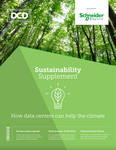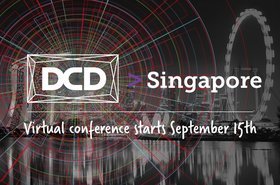There are a host of major challenges and opportunities around the issue of data center cooling currently facing infrastructure owners and operators. In order to investigate further the technologies that are driving expansion, innovation and sustainability in this sector, the team here at DCD assembled (virtually, of course) three global leaders to guide us through some new solutions, from a re-balancing of the CAPEX to OPEX investment model, to the role of plastic, and a response to industry concerns around water availability, consumption.
This session, available to watch in full by filling in the form at the bottom of the page opened a window into the future, providing practical and useful insights for both engineers and executives.
Turn the data center itself into a new source of energy
Opening up was Yunshui Chen, Founder and Group CEO at Airsys, who sees one of the most important trends in the next couple of years being liquid cooling or, to be more specific, indirect liquid cooling technology, which does not have a requirement to change the existing infrastructure and can be rolled out as a plug-and-play solution.
Chen tells us more about the benefits: “As it will target the heat source precisely and turn the data center itself into a new source of energy and, secondly, the IP load itself will reduce 30 percent of its energy consumption by just eliminating the air cooled components and, thirdly, the density of each rack can also be increased.”
There’s also a further significant business case that Chen is keen to share: “One of the critical challenges facing every data center operator is the uncertainty of your future load, which delivers your future revenue. Indirect liquid cooling technology can be part of the shift from a CAPEX to an OPEX model, so it moves from a big investment upfront to a ‘cooling as a service’ model, meaning you pay only a flat fee, flat rate for the cooling you use.”
Taking this innovative thinking a step forward, we move into the role of engineering and design around the transition from metal to plastic for more sustainable and efficient solutions with Sanjay Patel, Global Business Development, Specialized Solutions at GF Piping Systems, a company with over 200 years of experience at the cutting edge of technology. In Patel’s presentation, he focused on their engineering capabilities, and how they support their partners in the design stage.
Studies show, he says, that up to 40 percent of design errors result in stress cracks, while another 22 percent are linked to water hammer - stress caused when a water in motion is suddently forced to a stop - so it is therefore important to prevent design errors from happening.
Patel continues: “Across the many areas of the project, there will be numerous engineering calculations that need to be taken into consideration to ensure it all works correctly. Our engineers support our customers transitioning from metal to plastic, or they may be using plastics already with their calculation. Our unique software package takes into consideration the long term effects of plastic, typical application areas that customers struggle with and our own stress analysis.”
Our final perspective comes from Jon Pettitt, Chief Commercial Officer at Excool, which provides advanced data center cooling, who offers some video demonstrations from the company's test lab.
A changing industry has led to a different approach to their work today: “We’ve been delivering cooling for over a decade, but data center developments are far larger today than they were in 2010. We cannot continue to use a valuable resource such as water at the same volume that we did ten years ago. This is where our Excool Zero cooling system comes into play, as the most effective, efficient and lowest energy process currently available to cool data centers.”
Pettitt continues: “It lowers our dependency on water to a point where we can operate the system with minimal water quantities and even run dry If required, or even when water is unavailable. It’s designed with sustainability in mind, using a high proportion of recycled material, these materials are also non-corroding and we also offer a 20 year anti corrosion warranty.”
Watch the full technology showcase focused on cooling 'on-demand' by filling in the below form:
Further reading
-

Sponsored Interview: Airsys CEO Yunshui Chen on the changing cooling landscape
Airsys’ latest development is what it calls ‘cooling-as-a-service’ - data center cooling without the upfront capital expenditure
-

The Sustainability Supplement
How data centers can help the climate
-

Episode Cool & Control Tech Showcase

